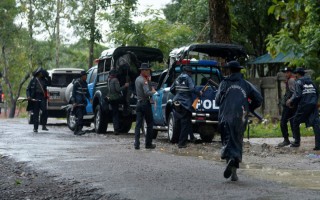Rohingya influx: Children face health crisis
Many Rohingya children who have entered Bangladesh recently along with the parents fleeing violent military crackdown on the ethnic minority community in Myanmar are now facing health crisis suffering from cold related diseases without any access to treatment.
Reports of children suffering from cold related diseases including pneumonia are coming from local pharmacists as Rohingya refugees, mostly women and children, continued to live under the open sky at Teknaf in Cox’s Bazar.
The situation is feared to deteriorate as more Rohingyas continue to enter the country following days of risky journey through forests along swampy coastline of Myanmar and Bangladesh often without having warm clothes to protect them from the cold.
International Organisation for Migration and UN refugee agency UNHCR said on December 6 that over 21,000 Rohingyas had entered Bangladesh since Myanmar military launched a massive operation against the minority Muslims in Maungdaw of the northern Rakhine state following attacks on border outposts of Myanmar’s border guard police on October 9.
Over a quarter of the refugees are children, mostly aged below 12, said Rohingya leaders.
‘Most of these kids do not complain of illness as they seem to have understood that they are in much better condition here for they have seen the worst,’ said Ilias Hossain, a Rohingya leader at Leda makeshift camp.
‘But we observe them coughing, see tears in their eyes as they struggle to breath, we feel their body temperature,’ he added.
Rashid Ahmed’s 30-month old daughter Minara started showing signs of cold after they came to Nayapara at Teknaf from Raimma Bil in Myanmar four days ago.
Minara became seriously ill early Friday and was having trouble in breathing. She also has high fever.
Minara’s parents tried in vain to have her treated at the clinics at Leda and Nayapara refugee camps.
‘The hospital people won’t pay attention to us as we are newcomers,’ said Rashid, adding, ‘One of the clinics did not even let us enter while the other one sent us away giving paracetamol syrup.’
At about 7:00am on Friday, Rashid and his wife Shamsunnahar ran along the Nayapara road for help from anybody to save the life of Minara.
Local people came forward offering them money and a trip to the hospital at Kutupalang refugee camp. The condition of Minara was stated to be
critical.
The incident was a grim reminder of what happened to a five-month-old baby hours after he entered Leda camp along his mother from Myanmar in the last week of November. The baby was believed to have died of pneumonia.
A pharmacist at Leda camp, Shahidul Islam, remembered the death of the baby very well and he could not refuse treating a child patient of Pneumonia three days ago.
‘I did what was necessary to help the child breath…His treatment was not completed, but I could not afford to offer the entire treatment free,’ Shahidul said.
At a hut inside Leda camp, siblings Shahid, 1, and Rasmin, 2, coughed continuously as their aunt Mariyam Khatun, 22, recalled her 11-day journey through forests to enter Bangladesh on December 7.
After spending two days under the open sky, they found a shade over their head Thursday night.
Cox’s Bazar deputy commissioner Ali Hossain said that they were expecting to get a decision with regard to government assistance to Rohingya refugees by Monday.
Rohingyas are considered the world’s most persecuted minority people. They are denied citizenship and basic human rights like education and treatment in Myanmar. The Rohingya population in Myanmar is stated to be over a million.
Repeated attacks have led 3-5 lakh Rohingyas to take shelter in Bangladesh.
- See more at: http://www.newagebd.net/article/4483/rohingya-influx-children-face-health-crisis#sthash.gLvxfz5l.dpuf











